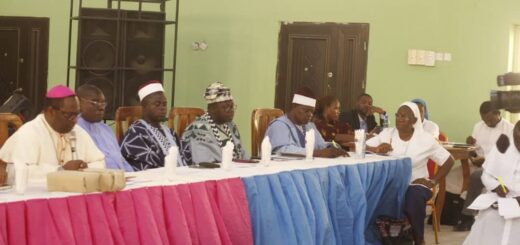Compassionate Jesus in a Leprous World
by ARCH BISHOP · February 14, 2021
Sixth Sunday, Year B, Homily by Archbishop I. A. Kaigama at Our Lady Queen of Nigeria Pro-Cathedral, Abuja, February 14, 2021.
Readings: Lev. 13:1-2, 44-46; Ps. 31(32): 1-2, 5-11; 1 Cor. 10:31-11:1; Mk. 1:40-45
The first reading from Leviticus chapter 13 refers to the Old Testament Jewish culture which regarded lepers as unclean. Anyone diagnosed with leprosy was quarantined and so, excluded from the community. A person who was healed of leprosy had to present himself to the priest, who would confirm that he had been cleansed, as Jesus directed the leper to do in today’s Gospel. So stigmatized, lepers were expected to wear torn clothes and to cry out as they approached people saying, “Unclean, unclean” (cf. Lev. 13:45). In some cases, they had to hang bells on their necks to alert those who were clean as they approached them.
In contrast, the Gospel describes the healing of a leper by Jesus. By stretching out His hand and touching the leper, Jesus broke the barrier between the “clean and unclean,” to show us that in the family of God, no one is to be discriminated against, rejected or excluded. We must build bridges of love and not walls of hatred as we do today; to show compassion especially to those maltreated, deprived and rejected by the society.
The disease of leprosy symbolizes the misery of our sin-infected society and disfigured humanity. More increasingly, our world wants to do everything by mere human reasoning or scientific and technological skills, hoping by this, to conveniently exclude God who is seen as an intruder rather than the Creator of heaven and earth, and those things that live and move in them. Our world is trying very hard to distance God from human affairs and to distance human hearts and souls from God, so that modern man can live comfortably with all kinds of freedoms without God!
Today in the world, poverty is a menacing social disease, and being poor is enough justification for maltreatment. Those living with HIV/AIDS, the mentally, emotionally or physically challenged, ex-convicts, illiterates, alcoholics, drug addicts, the critically sick and even those battling with the deadly coronavirus disease suffer a lot of discrimination or condescending treatment.
Apart from physical leprosy, the world today suffers from the leprosy of sin, worse than any infectious disease. Sin corrupts our soul, separates us from God, spoils our relationship with one another, makes us perpetually enslaved, makes us unclean, keeps us troubled, robs us of our innocence and inner peace, and separates us from the community of believers.
Here, I wish to commend the members of the Family and Human Life Commission of the Archdiocese of Abuja, headed by Sir Dan Anaebo Okekenta, KSJI, who requested for this Mass in thanksgiving to God. I commend you for your dedication and commitment to promoting genuine and healthy family life. I urge you to be solid in the defence of human life and the promotion of good home training of children in the family, the domestic Church. Be advocates of the culture of life and promoters of the dignity of the human person at a time when family life is threatened by marital crises and modern ideologies that are inimical to life. You must endeavour to reconcile families in trouble and formulate programs that will instill the good upbringing of children.
As the world celebrates Valentine’s Day, let it be about true love in daily human interactions and relationships, in marriage and in the society. St. Paul states that love is the greatest and without love we are nothing (cf. 1 Cor. 13:1-3, 13). Unless we can show true love to others, all we say is ineffective, what we say is incomplete, what we believe is insufficient, what we give is insignificant and all we accomplish is inadequate.
On this 6th Sunday of the year, we can draw many lessons from the readings today:
What stands out about the leper is that he wanted not his will to be done but that of Jesus, and as a consequence, he was healed and re-integrated into the community.
Having been cleansed, he went about proclaiming the good news even though he was instructed by Jesus not to do so. Our world needs bringers of good news: the healing of wounded hearts, peace, joy and progress and not the news of kidnapping, terrorism, banditry and other man-made miseries we inflict on one another because of large-scale deficiency of morality and very corrupt practices.
The healed leper teaches us to pray but more importantly, to leave everything to God’s will and time. Thus, he said to Jesus, “If you want to…” meaning, do it to me according to your will (cf. Lk. 1:38).
By touching the leper and making him clean, Jesus shows that He is the Lamb of God who takes away our sins (cf. Jn. 1:29), and so if we approach Jesus in the sacrament of reconciliation He will take away our sins and make us clean inside.
Through Jesus’ encounter with the leper, we learn that God never ignores because of our physical or spiritual condition. Every human being is precious and God embraces all who come to Him.
We must admit that modern man is sick and as St. Augustine says, we need a doctor and that Doctor is Jesus (cf. Conf. X, 39).
Having just celebrated the World Day of the Sick, let us entrust all those who are sick in our world, especially those in hospitals to Mary our Blessed Mother and ask her to speak to her son, the true Doctor, to heal them completely. In the same manner, we pray for those whose marriage has been infected by “leprosy” such that they don’t enjoy the love that is patient, kind, gentle and forgiving.
May God grant His healing, peace and joy to them and indeed to all families.




